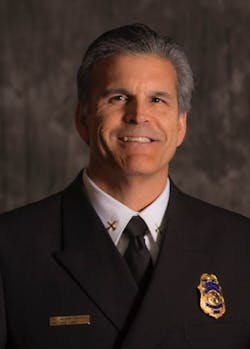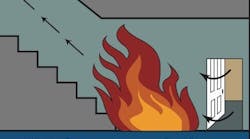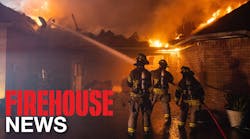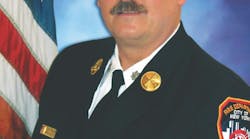For almost 12 years, I taught a course titled, Introduction to Fire Service Ethics. I always started the first class with a simple question, “Why be ethical?” To my surprise most students didn’t have a well thought out answer. I’ll ask a similar question here. Why write an article on ethics? More specifically, why write an article on ethics for the fire service?
I can think of some reasons why writing such an article would be difficult. First, ethics entails a broad subject matter. There is no way to cover everything in a short article, so where does one begin? Second, as a society, we no longer share the same moral foundations as in the past. Our values differ among communities, generations and ethnicities. This means disagreement – sometimes, impassioned disagreement. Third, firefighters prefer action. However, ethical reasoning entails quiet contemplation. Arriving at ethical priorities, values and conclusions often require much thought before any action takes place. Lastly, most people consider firefighters ethical.1 Of all people, do they really need ethics training? The shock and disappointment felt by the community when we make the evening news for ethical misconduct reveals their belief in the morality and integrity of firefighters.
The Need for Ethical Decisions
However, I can also think of some very good reasons to write such an article. Our nation’s fire service – career and volunteer – is funded by tax dollars (in part or whole); federal, state and local grants; and monies donated by the local community.2 We work “for the people.” We are rightfully under the watchful eye of the people we serve. This is a good thing. Being a public servant is an honor, one we should all cherish. We represent something bigger than ourselves. What we do reflects back on our communities either positively or negatively. Furthermore, we are professional firefighters. Those who study professionals have discovered three distinguishing marks setting them apart from non-professionals.3 First, professionals are educated. Their job demands a specialized knowledge, something beyond mere training. Second, they are organized and work at self-improvement. Finally, professionals adhere to moral standards. I would add that none of this would make sense if professionals weren’t in the business of serving others. This is why moral standards are so important. We represent, work for and with, other people for the common good – in our case, life safety and fire protection.
A third motivating reason for writing about ethics is identical to one that makes the task difficult. Our country is no longer characterized by a Judeo-Christian ethic. In other words, we really don’t share the same values we once did. In addition, most departments have a multigenerational workforce, which while adding needed diversity, also brings very different value systems when it comes to work, pay and play. A final reason, one I want to briefly expand upon, is human frailty. We all, at times, desire the easy way and not always the right way.
Unethical Temptations
John C. Maxwell noted in his book, Ethics 101, there are at least five reasons why people experience lapses in ethical behavior: pressure, pleasure, power, pride and priorities.4 I would like to explore two of these causes in a bit more detail: pleasure and pride.
Pleasure
In my 30-plus years in the fire service, I have, encountered an array of unethical behavior, much of which can be attributed to the desire for pleasure. Behaviors such as stealing at the fire station and on emergency incidents; dealing and using drugs while on duty; and sex in the firehouse. Let’s face it; we live in a pleasure seeking society. “Get all you can get,” is promoted in TV ads and the lifestyles of the rich and famous. It’s sad, but not surprising, that it would occasionally show up at the firehouse. Thankfully, these behaviors are rare. But these represent the big-ticket items; more common abuses take place all too often. Some example are members coming to work late and leaving early “to make up for it,” “borrowing” EMS equipment for an upcoming outing, abuse of sick leave, partying too late the night before a shift and using department supplies when washing one’s personal vehicle.
So, how do we avoid these momentary lapses in good behavior? First, we need to concede the reality of temptation and human frailty. No one is perfect and we all experience moral failures from time to time. We also need to appreciate the fact that seeking pleasure is not wrong. It’s probably one of the most common activities shared by human beings. However, there are appropriate pleasures and inappropriate pleasures and also a right time and place for certain “gratifications.” Next, we need to understand, own, and be thankful for the great responsibility we bear as professional firefighters. This entails practicing discipline, avoiding known temptations, and being willing to make sacrifices. Having a mentor, someone to hold us accountable and offer guidance, is crucial. Reproducing that counsel by mentoring a younger member of the department is how we perpetuate professional values and conduct.
Pride
Even those unfamiliar with the Jewish and Christian Scriptures know the passage, “Pride goeth before destruction” (Proverbs 16:18).5 Nevertheless, it seems few of us think we are susceptible to the consequences of moral lapses. We – pardon the pun – like to play with fire. The kinds of behaviors connected with pride that have made the evening news or garner customer complaints are accepting bribes and favors (big or small), not fully taking care of a customer’s needs because we perceive the task as “beneath us,” and breaking the law while driving because we’re in “Big Red.” Thankfully, these kinds of behavior are rare and disapproved of by the vast majority of us. Nevertheless, smaller infractions take place. A humorous example of pride is the joke that goes, “How do you know someone works for the fire department?” “I don’t know, how?” “They’ll tell you!” We ought to take pride in our profession, but we can carry it too far and become puffed-up. Self-importance produces an, “I’m better than you” attitude, which leads us to mistreat one another around the firehouse. Inflated pride produces disrespect for those above and below us. It leads to arrogance displayed toward other city or district employees because we work for the fire department and “risk our lives.” It prompts us to repeatedly go to that popular convenience store because they’ll supply us with free drinks.
We are all susceptible to pride. It takes discipline and self-control to tame it. One good practice is to write out the kind of character and reputation you want to be known for and work towards acquiring it. Memorize your department’s Mission Statement and make it a priority. Recall how you felt the day you were hired – that’s the level of pride (mixed with fear), which produces public servants. Put a picture of your family in your locker and look at it often. This will remind you why you do what you do. Finally, remember, it’s the greatest privilege in the world to work as a professional firefighter. No matter what you think, you didn’t accomplish that on your own. Remember those who helped you along the way, thank them often, and do the same for someone else.
Conclusion
Why write an article on fire service ethics? Because being ethical is crucial to what we do and firefighters don’t run from difficult challenges. Since we are in the business of serving our fellow human beings, we have an obligation to maintain the public’s trust. This means working at professionalism and self-improvement. It also means being aware of our human weakness and frailties – our vulnerability to pleasure and pride. We’ve discussed some simple steps that we can begin taking immediately to ensure virtuous and responsible behavior. Now it’s up to you.
References
- Jeffrey M. Jones. 2010. Nurses Top Honesty and Ethics List for 11th Year: Lobbyists, car salespeople, members of Congress get the lowest ratings. Accessed on August 7, 2014. http://www.gallup.com/ poll/145043/nurses-top-honesty-ethics-list-11-year. aspx. GfK Verein: Global study on trust in professions. 2014. Accessed on August 7, 2014. http://www. gfk.com/news-and-events/press-room/ press-releases/ pages/gfk-verein-global-study-on-trust-in-professions --.aspx.
- Michael J. Karter, Jr. and Gary P. Stein. 2013. US fire department profile 2012. Quincy: National Fire Protection Association. Available at: http://www.nfpa. org/~/media/files/research/nfpa%20reports/fire%20service%20statistics/osfdprofile.pdf. John M. Buckman III, et al. 2004. A call for action. The blue ribbon report: Preserving and improving the future of the volunteer fire service. Fairfax: International Fire Chiefs Association. Available at: https://www.iafc. org/files/1VCOS/VCOS_Blue_Ribbon_Report.pdf.
- William F. May. 2001. Beleaguered rulers: The public obligation of the professional. Louisville: Westminster John Knox Press. 7-14. Kayhan Parsi and Myles N. Sheehan (eds). 2006. Healing as vocation: A medical professionalism primer. Lanham: Rowman & Littlefield Publishers. 9-21.
- John C. Maxwell. 2003. Ethics 101: What every leader needs to know. New York: Center Street. 55-70.
- Holy Bible, King James Version.
MIKE MUNOZ began his career as a firefighter with the Peoria, AZ, Fire Department in 1986 and is currently the battalion chief. For over 12 years, he has taught ethics for the Peoria Fire Department and has also taught ethics at Glendale Community College and Fayetteville State University. He currently serves on the Ethics Committee at Phoenix Children’s Hospital. He received his Bachelor’s Degree in Public Safety Administration from Grand Canyon University, a Master’s Degree in Education (Counseling) from Northern Arizona University, a Master’s Degree in Religion from Reformed Theological Seminary, and a Master’s Degree in Bioethics from Loyola University Chicago. He is currently working on a Doctorate in Bioethics from Loyola.






